The Human Target's Tom King on killing Guy Gardner and how Book 7 is the "sexiest comic book in 80 years"
Writer Tom King talks about Guy's murder in Book 6 and the upcoming Tales of the Human Target special and the "sexy" Book 7
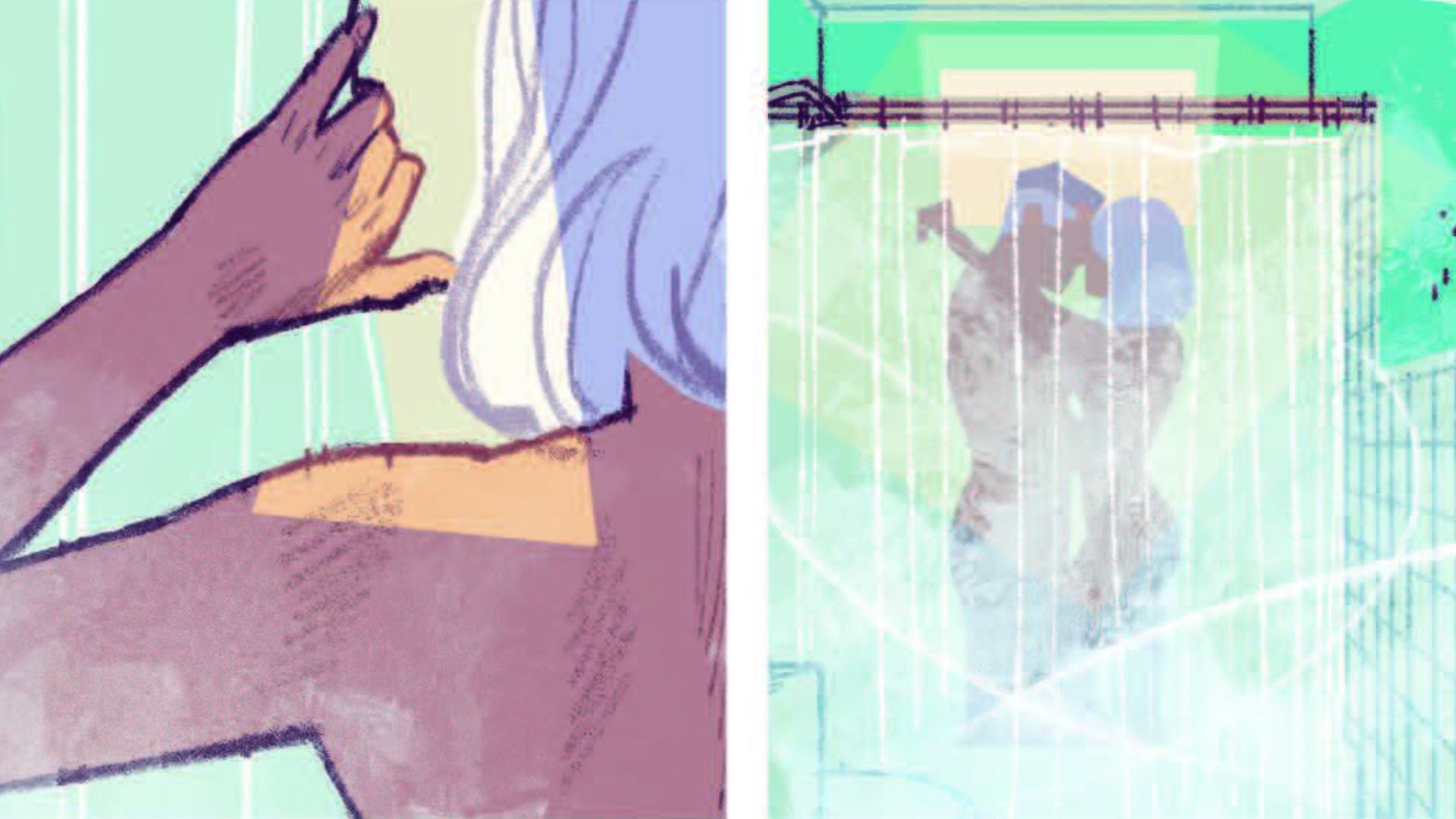
Tom King knows what he did.
Along with artist Greg Smallwood and letterer Clayton Cowles, King managed to pull off one of the greatest cliffhangers in recent comics memory. At the end of Human Target Book 6, a major DC character died, sending shockwaves through DC fandom and leaving readers desperate for more information, especially since the book went on hiatus immediately after. It seems, however, that King also understands our pain, and has decided to give us a little bit more info as we wait for the next chapter of The Human Target.
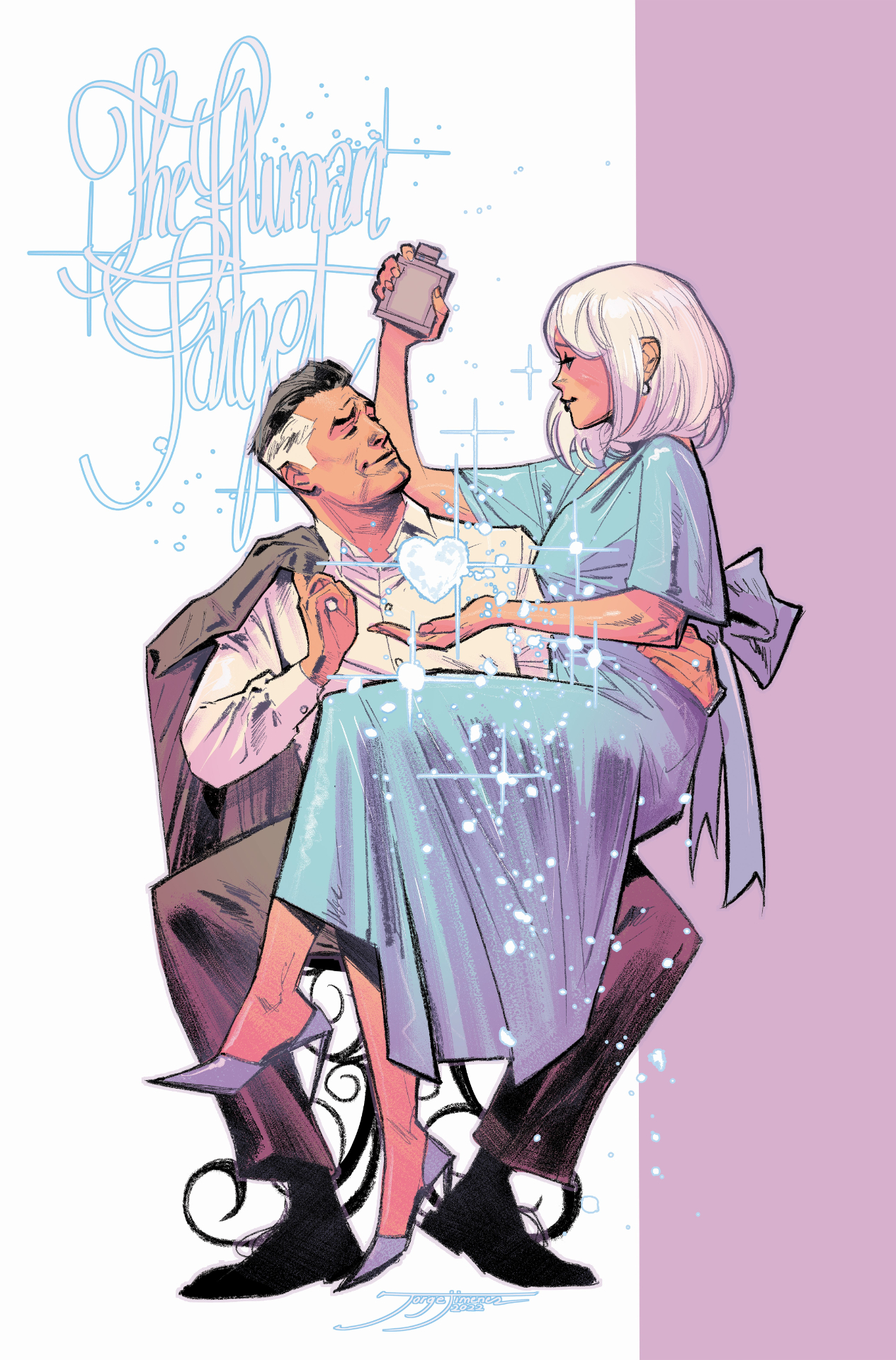
That info comes in the form of Tales of the Human Target, which is written by King and features art by Smallwood, Rafael Albuquerque, Kevin Maguire, and Mikel Janín, colors by Dave Stewart, Alex Sinclair, and Arif Prianto, and lettering by Cowles. The book explores the history of three major players in the Human Target storyline, delving into their relationships with the recently murdered (but still working) Christopher Chance. Ahead of the book's release, Newsarama sat down with King to better understand who we're spending time with in Tales of the Human Target, as well as what's in store for the main series' seventh issue.
Read on to hear what he had to say, but beware, we do get into that cliffhanger right off the bat. So if you haven't read Book 6 of Human Target yet, best to do so before continuing.
Grant DeArmitt for Newsarama: Okay Tom, let's talk about the future of The Human Target.
Tom King: Thank God there is a future. I missed that book.
Nrama: I missed it, too. Especially that Smallwood art.
Comic deals, prizes and latest news
Get the best comic news, insights, opinions, analysis and more!
King: Oh, I know this is an art book. This is not about my writing. This is like, it sucks because it's the first time I'm selling a book not all based on anything I've done. It's just, like, this is the Smallwood story and I'm just getting out of his way.
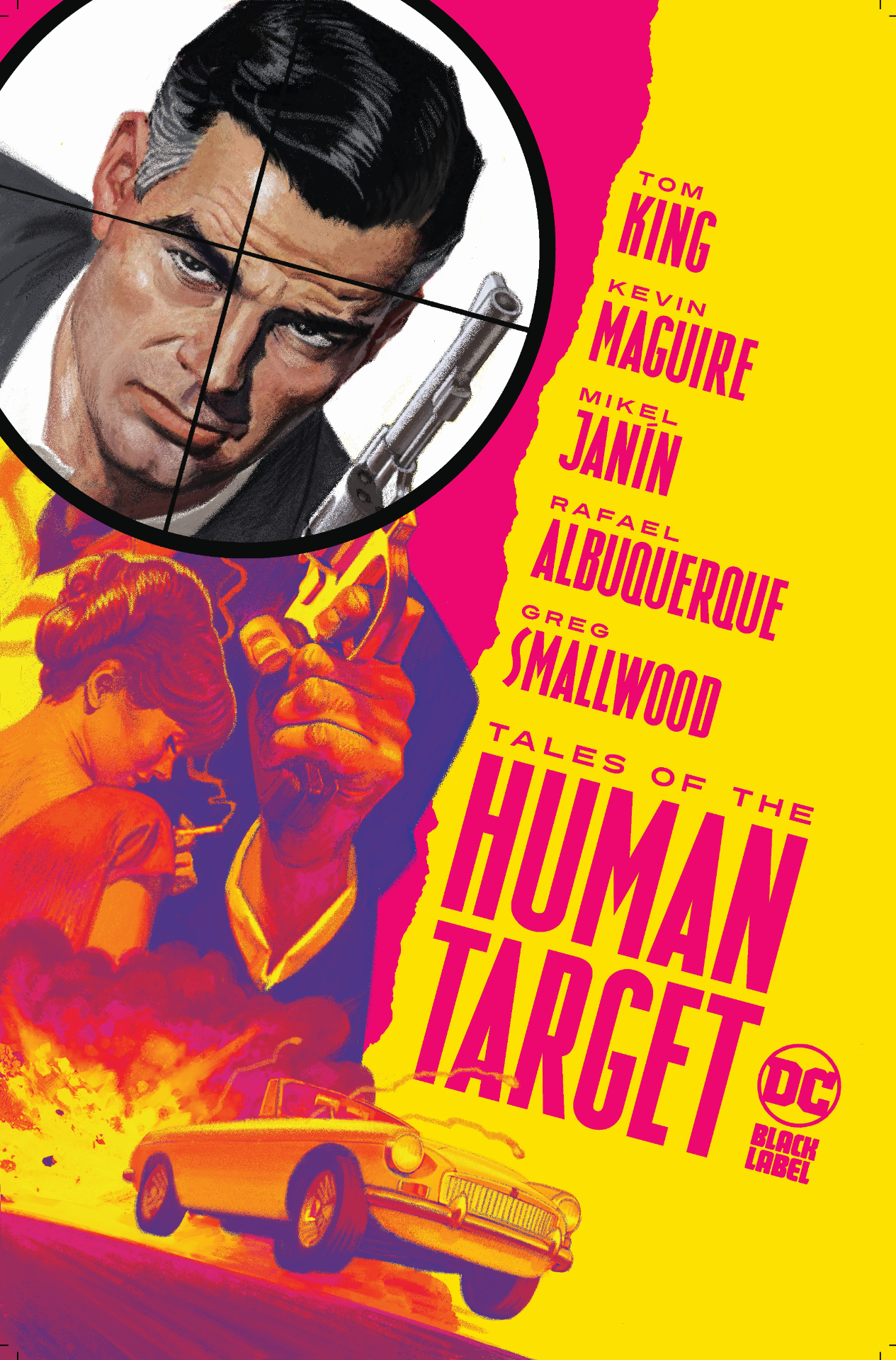
Nrama: Well, I definitely think there's a lot to be said about the art, but the story is incredible as well. Speaking of - it has been a couple of months, so it's been long enough that we can talk about the end of Book 6.
King: All right. Let's do it.
Nrama: You killed Guy Gardner.
King: I did.
Nrama: What were the reactions you were getting to that? Both from folks you know and places like Twitter?
King: It ran the gauntlet. I feel like I've done much worse things in my career. I started by killing Kyle Rayner back in the day, and I killed Alfred later. Actually, the one that people took the hardest… Batman and Catwoman apparently didn't get married in this one issue? Have you heard about that? So I've weathered the storm before.
Much like Batman #50, We're halfway through the series. So you would expect a low, a little bit of pain before it comes back. But, I mean, this is a series about twists and turns. So, you know, be prepared; there's some cool stuff coming in regards to the death of Guy Gardner. The whole point of the Human Target is that everything is not as it seems.
Nrama: Interesting. Speaking of being halfway through the series, let's talk about Tales of the Human Target. This book is a kind of interlude between the two "seasons" of Human Target. First of all, was this book always a part of the plan?
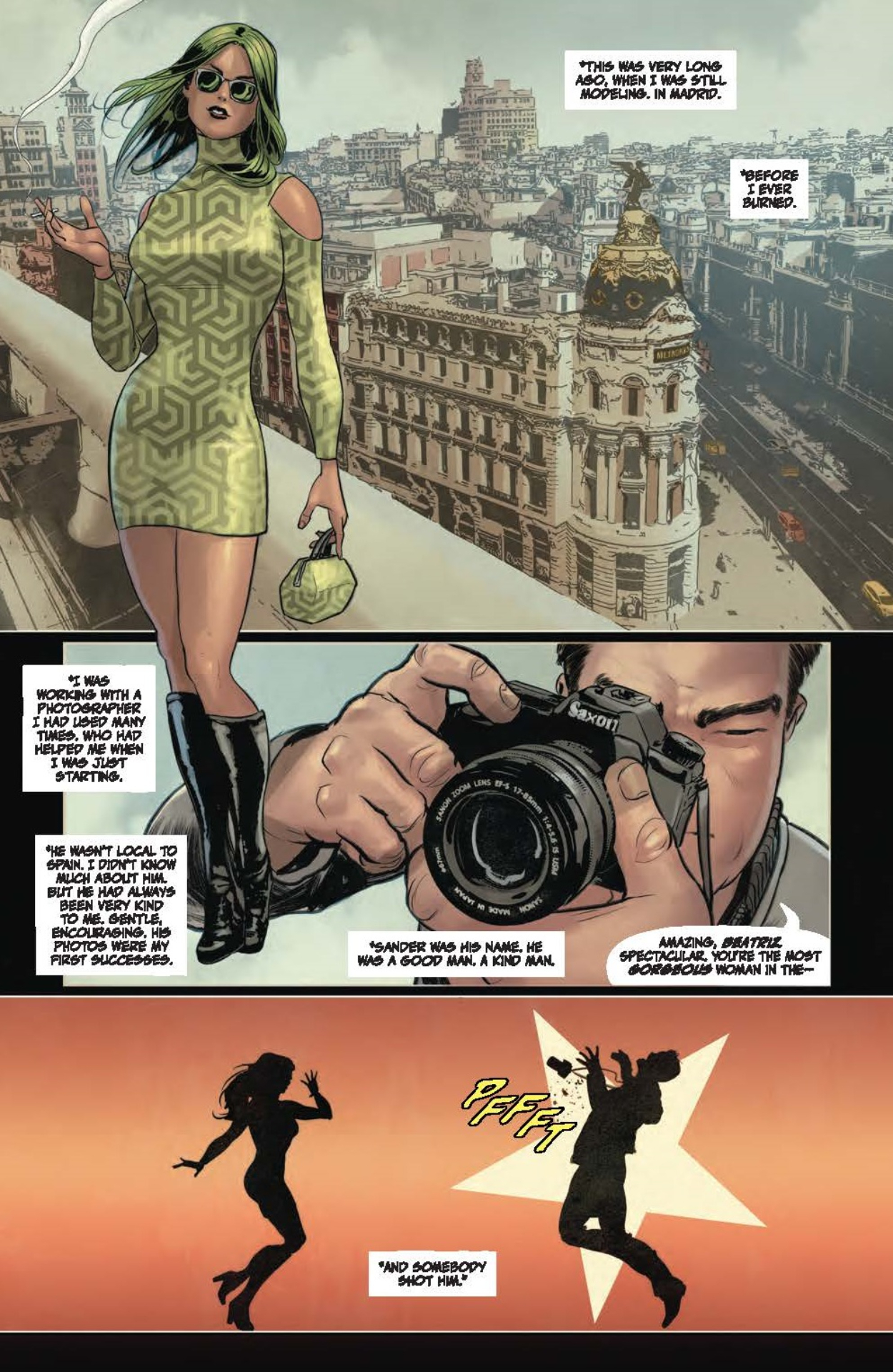
King: No, definitely not always. When it became apparent that Greg [Smallwood] was doing something super special, we decided we needed to give a brilliant artist time to be brilliant. And that's what created sort of a "season one/season two" scenario where we do the first six issues and then the next six.
When you have one of these big gaps, it's, you know, a nice thing to do for the fans to be like, okay, here's like a big special that we can only give you during the wait, to help you fill the gap and get some Human Target on your plate. I've done this before, you know, we did this with the Batman/Catwoman special. Part of that was because John Paul Leon sadly passed away.
With [Tales of the Human Target], I worked with the editors to concoct little background stories to work with, then three of my favorite artists of all time. To do just a little extra Human Target material for the fans.
Nrama: It's great material. So it's a look into three of the suspects in the Human Target storyline, three of Chance's potential poisoners. Guy Gardner is one of them, Fire is one of them, and then there's Booster Gold.
King: Yes. The way those came about is [DC] said we're looking at three different artists' schedule gaps. Their schedules came in and they can do this. And I mean, they're just the best people; Mikel Janín, who I've done more Batman with than any pair alive; Rafael Albuquerque, it's my first time working for one of the great geniuses in comics who has this very rare, small schedule gap; and then, of course, Kevin Maguire, who is one of the founding fathers, one of the Mount Rushmore of the JLI.
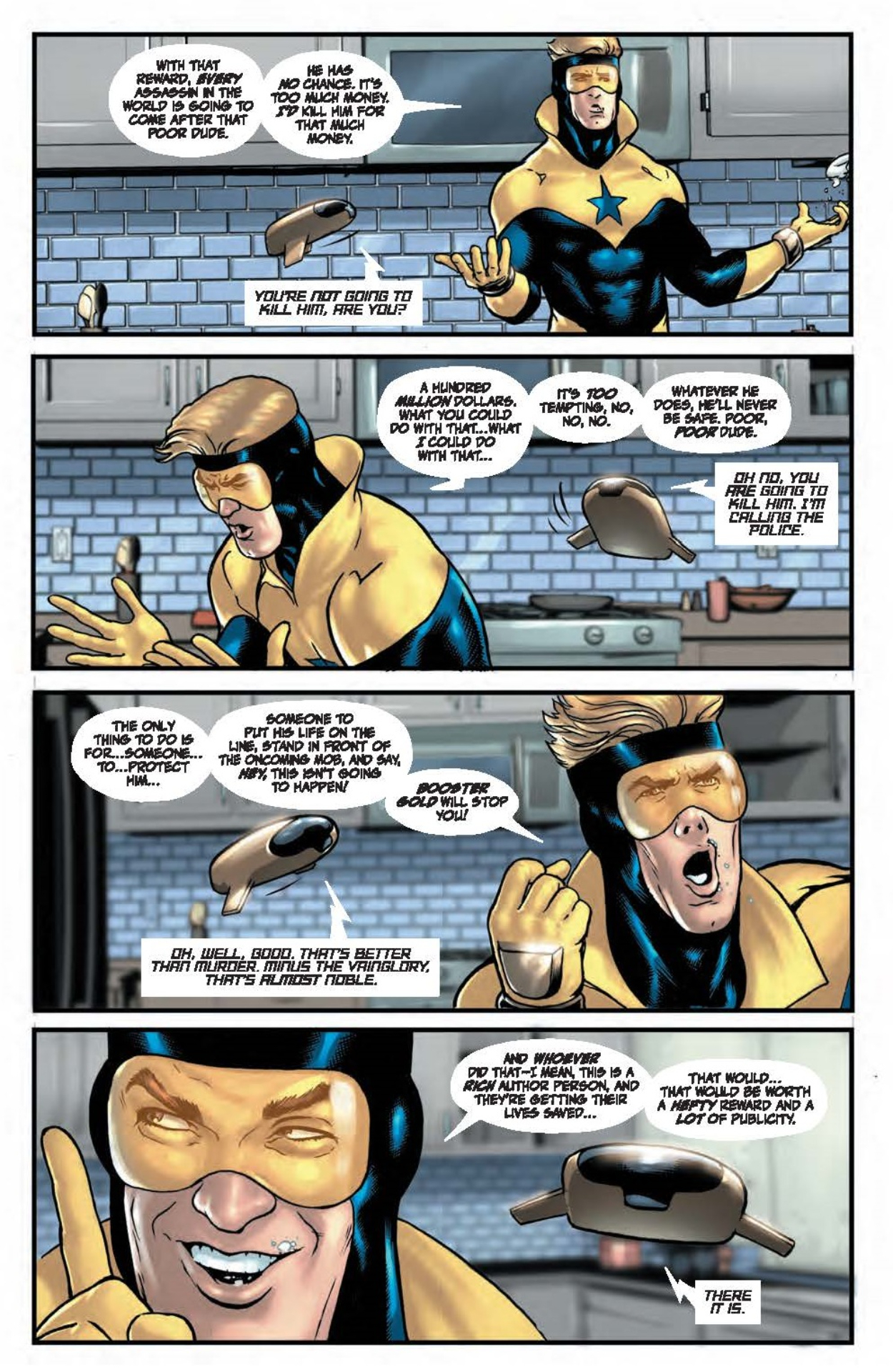
I asked each of them 'we're going to tell these little stories of the JLI meeting the Human Target before the series.' So they all just picked their favorite one and got to work. Rafael picked Guy Gardner, Mikel picked fire, and Kevin picked Booster Gold. So I built the story around those three characters.
Nrama: I love hearing that this came about because they wanted to do those characters. Alright, so let's keep talking about Guy Gardner. Now I know you're a literary guy, and one of the characters in Tales of the Human Target is named 'Salinger.' Plus, Guy talks a lot in this book about how he hates 'phonies.' So is there some Holden Caulfield in your Guy Gardner?
King: Yeah, I feel like Guy Gardner has a little Holden Caulfield in him. What makes Guy both awesome and awful is that sort of personality. He sees the whole system for what it is and says, 'I'm going to step outside of it and tell you why it's crappy.' As comic book fans, we live inside that system of good guys versus bad guys. And so someone who sort of stands outside of it can look very assholic. Guy Gardner does like an asshole at times; he does break rules that he shouldn't break. But he also has a different perspective. That's both his charm and his flaw. And that's Holden for you. You're kind of rooting with him and against him at the same time.
Nrama: This could just be me reading Catcher in the Rye incorrectly, but with Holden, I always thought that he was a fake, a phony. But with Guy, isn't he a bit more genuine? Even though he's a hypocrite, like Holden Caulfield.
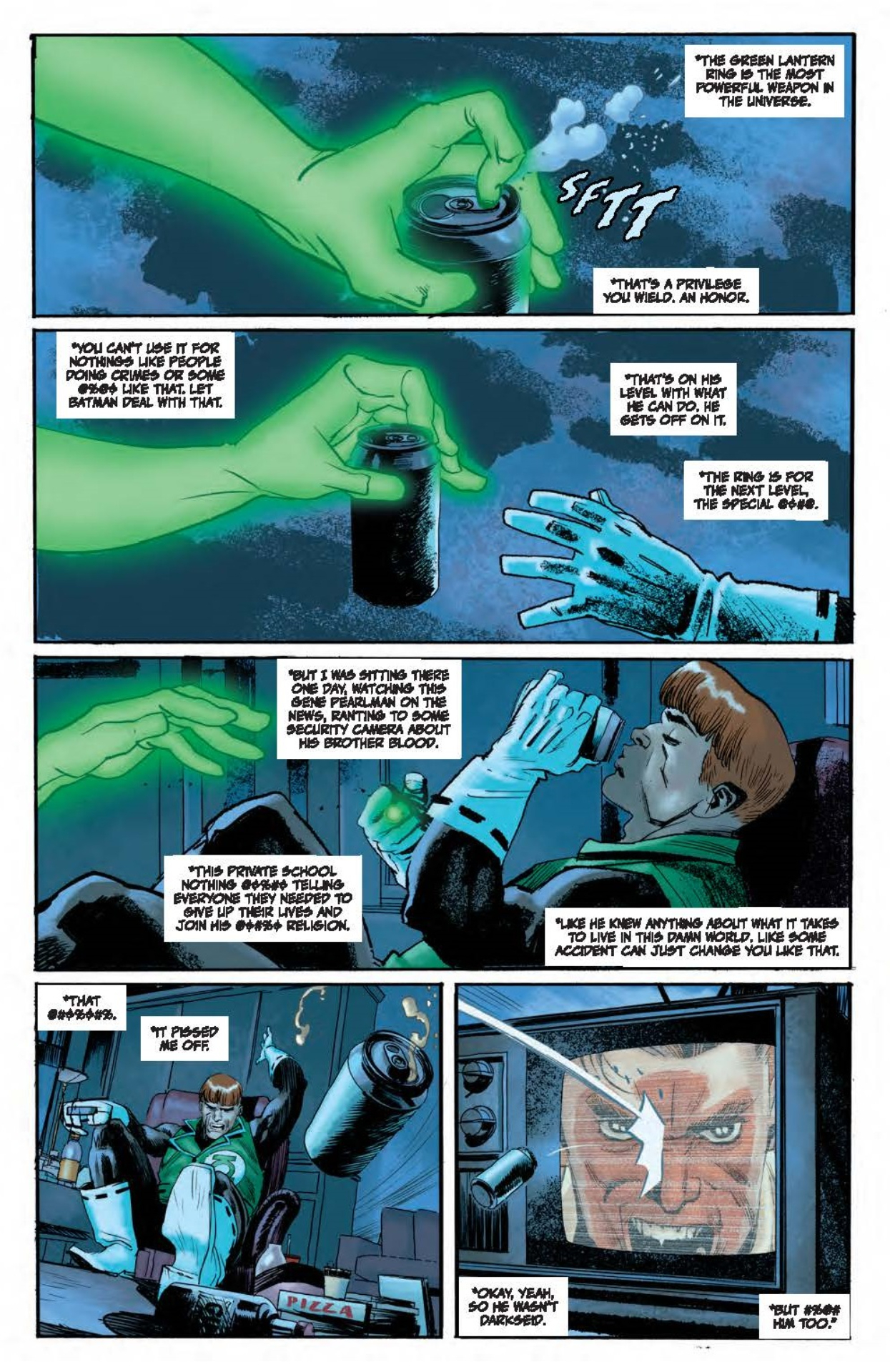
King: I think there is some phoniness to Guy. His origin story is that when Abin Sur crashed on Earth, there were two people who were fearless and the signal went out. Hal just happened to be just a little closer, you know, it's nothing but the wings of fate. Because of that, Guy got in this bus accident, which caused him brain damage, which made him into this sort of grumpier, different kind of person.
So I think that if you asked Guy, 'do you wish you'd gotten that ring first and been Hal Jordan?' he would say yes. But never out loud. That's the phoniness of Guy, this deep, sad regret inside him that he couldn't be Hal Jordan. And he covers that with a lot of bravado and a lot of coolness and a lot of like, you know, 'I'm not going to go down.' But that moment where he was just like ten feet too far from being everyone's hero and instead became sort of a joke is his sort of tragedy.
Nrama: That's great, and that definitely comes through in this book. Okay, moving on, the next character that's in Tales is Booster Gold.
King: My favorite character in comics. I love writing him.
Nrama: Oh yeah?
King: I tell Dan Jurgens all the time, 'thank you for creating this character.' Even if I write him a little differently than Dan would write him, because Dan writes him a little smarter than I write him. I write him a little more goofy. But I love that sort of goofiness of him.
Nrama: Is that what attracts you to the character? The goofiness?
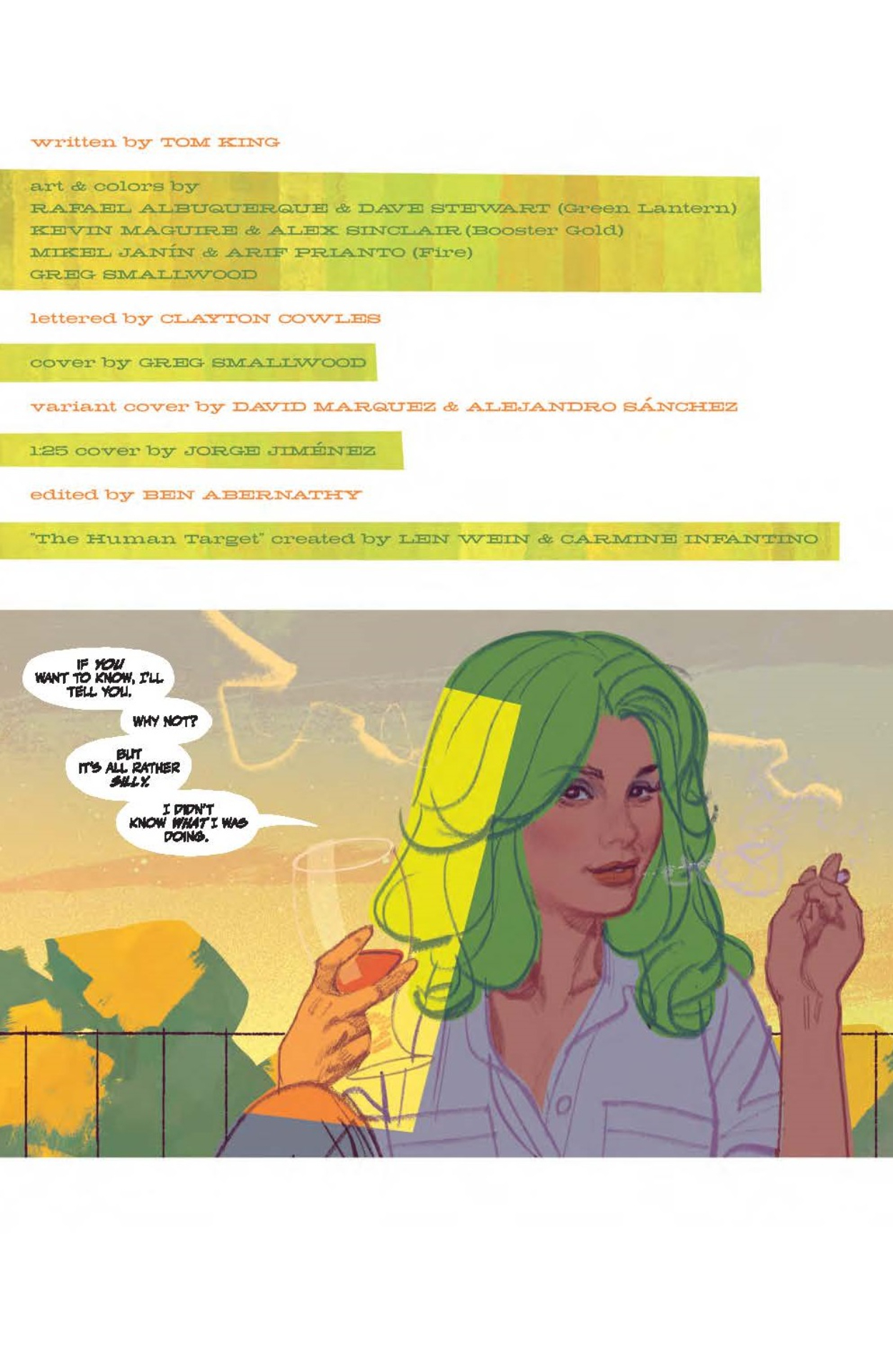
King: There are two things that attract me. Number one, I write these tragic, sad things. I never get to write funny. I love writing funny. I love comedy. It's a chance to get into that. And yeah, there's this like, don't tell anybody this, but I base him kind of on Futurama, on Zapp Brannigan and Kiff. You know how Skeets is his partner who, like, loves him and hates him at the same time? I love that.
I also love – this is the thing I got from Jurgens. What Jurgens understands about this character is, that in the end, Booster does the right thing and doesn't get credit for it. He's the superhero who's like, yes, he first thinks of himself. Yes, he first thinks of money. Yes, he's a goofball. But at the end of the day, he's really a really good person. He really is self-sacrificial. But just because of all that other bravado stuff, nobody gets to see that part of it. He's one of the nicest, best heroes in the DC Universe. Everyone assumes that because he's a goofball, he's not good. And I love that about him.
Nrama: So in the beginning of Tales, when he has that monologue about being just like Superman, he's actually right? He's closer to Superman than we give him credit for.
King: People forget that in 52, the big DC event, he was the Superman for a time. A character called Supernova. So again, you read that and you're laughing at him, but there is something in him that's just a little Superman.
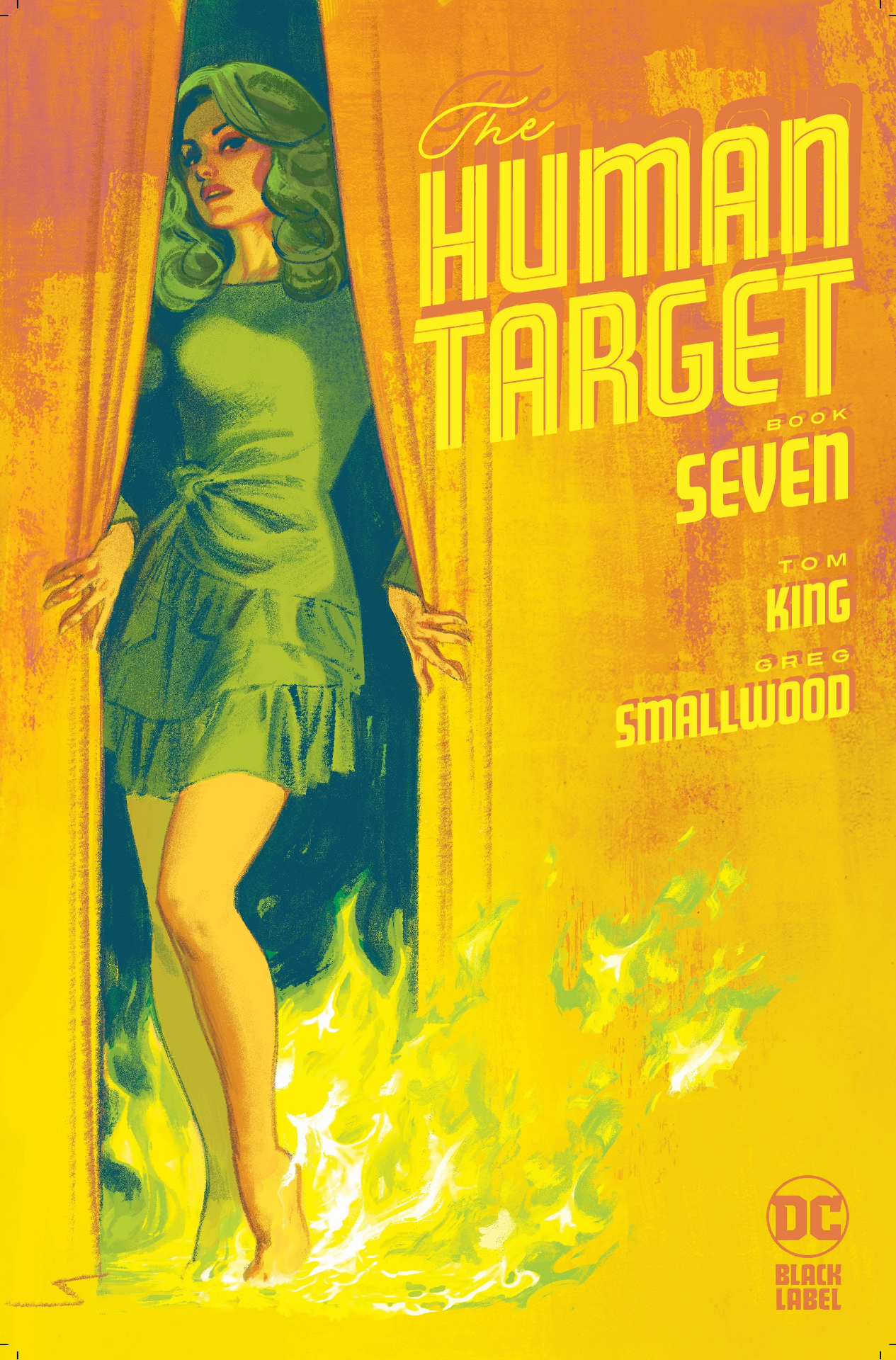
The craziest part about Booster is that he had the stupidest plan in the world. He's like, I'm going to go into the past. I'm going to steal a bunch of tech and go back and be a superhero. And then he actually did it! He executed the stupidest plan, and it worked! There's something Brave and Bold about that.
Nrama: Very cool. All right, so the third suspect in this book is Fire who, I'm not going to lie, I know next to nothing about.
King: She hasn't had that many appearances.
Nrama: True. I just fell so in love with her in Tales of the Human Target, because she's this deeply, almost tragically loyal person. Where does that loyalty come from?
King: I mean, when you're looking at who Fire is and what her role in Human Target is, you're looking at Ice, because Ice is our second lead in the book. The tale of their loyalty and friendship and deep love for each other is part of this whole book. That's why Fire's story is going to center around how she's the kind of person who will just do anything for the people they love.
I know people like this, everybody knows people like this. It might come from having a tough childhood, I don't know. I put that in there. Fire grew up poor in the poorest part of the world, where no one loved her. She's the type of person who, when someone finally does, you know, you feel it more. When Fire finally finds love, she appreciates it and keeps it to an incredible degree. If you were denied something for so long, when you finally get it, it feels like the world. That's who she is in this issue, to an almost comical extent. She's loyal.
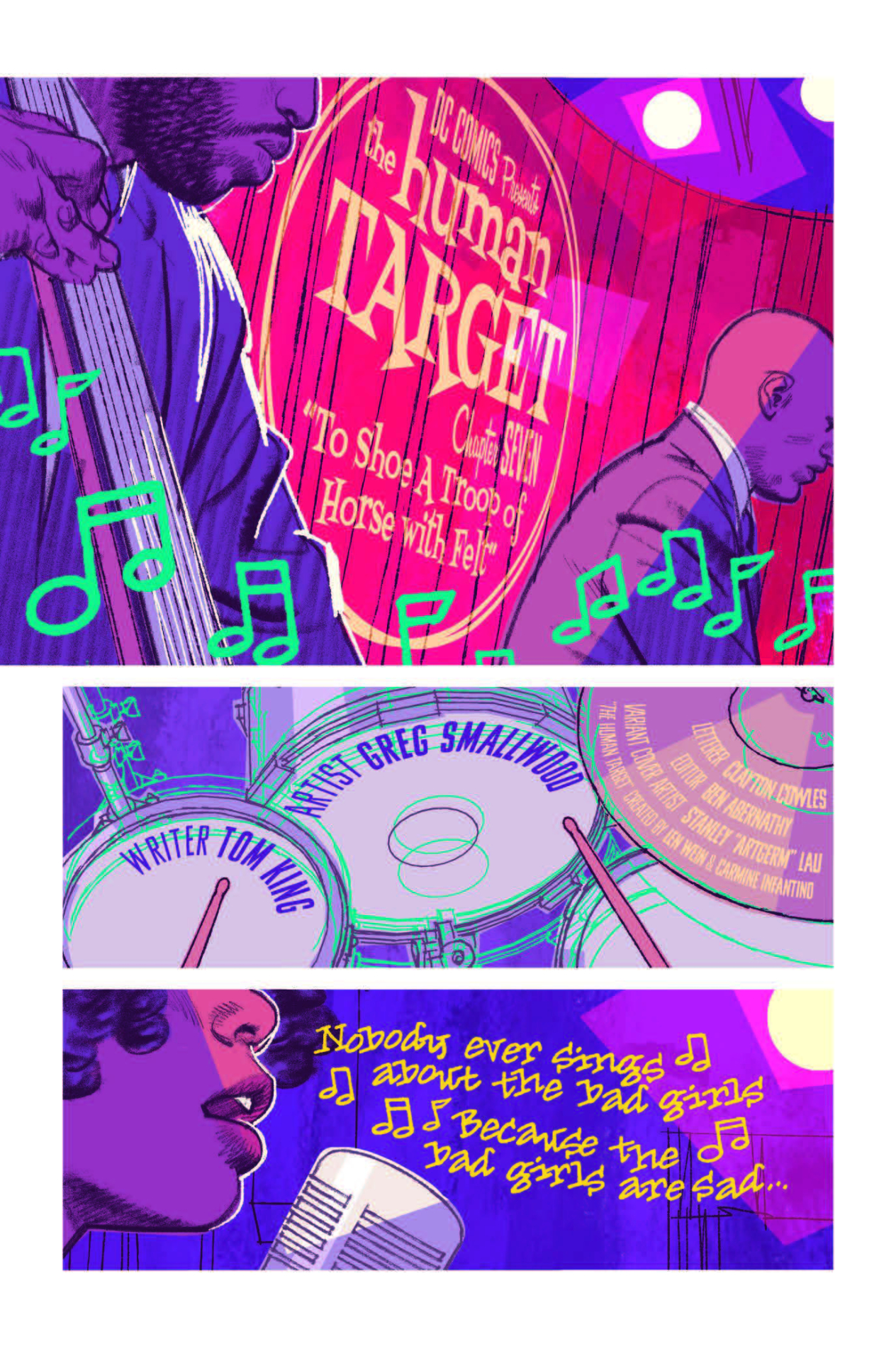
And of course, that is a problem for Chance. The whole book is each suspect being true to themselves, and that ends up fucking up Human Target's mission. That's the not subtle theme of the whole thing. And that's what the JLI is, right? That's what made them so awesome in the '80s and makes them awesome today, is they don't take the straight line. Each of them is idiosyncratic. You know, they're iconoclastic. They're different. Positively dysfunctional.
Nrama: True. Okay, so Fire is a main character in Tales of the Human Target, but she's also the subject of Human Target #7, which comes out September 27th. In that book, Chance is investigating her as a possible murder suspect. Now, I'm not asking where she did it in this case, but since we're talking about Fire's loyalty… would she kill for her friend?
King: Well, that's the whole reason Ice is with Chance, because that's the most obvious motivation. The most obvious lead for Chance to focus on is the idea that Lex Luthor killed Ice – though she was saved by Gail Simone – and so the person who has the easiest motivation for killing Luthor is the person who was most hurt by Ice's death.
But, see, Ice is loyal to Fire as Fire is to her. So Ice is saying, 'I don't want you to focus on my friend. It's not her. I'm going to try to help you solve this because now we're meeting the number one suspect.' That's the whole reason that Ice has put herself there.
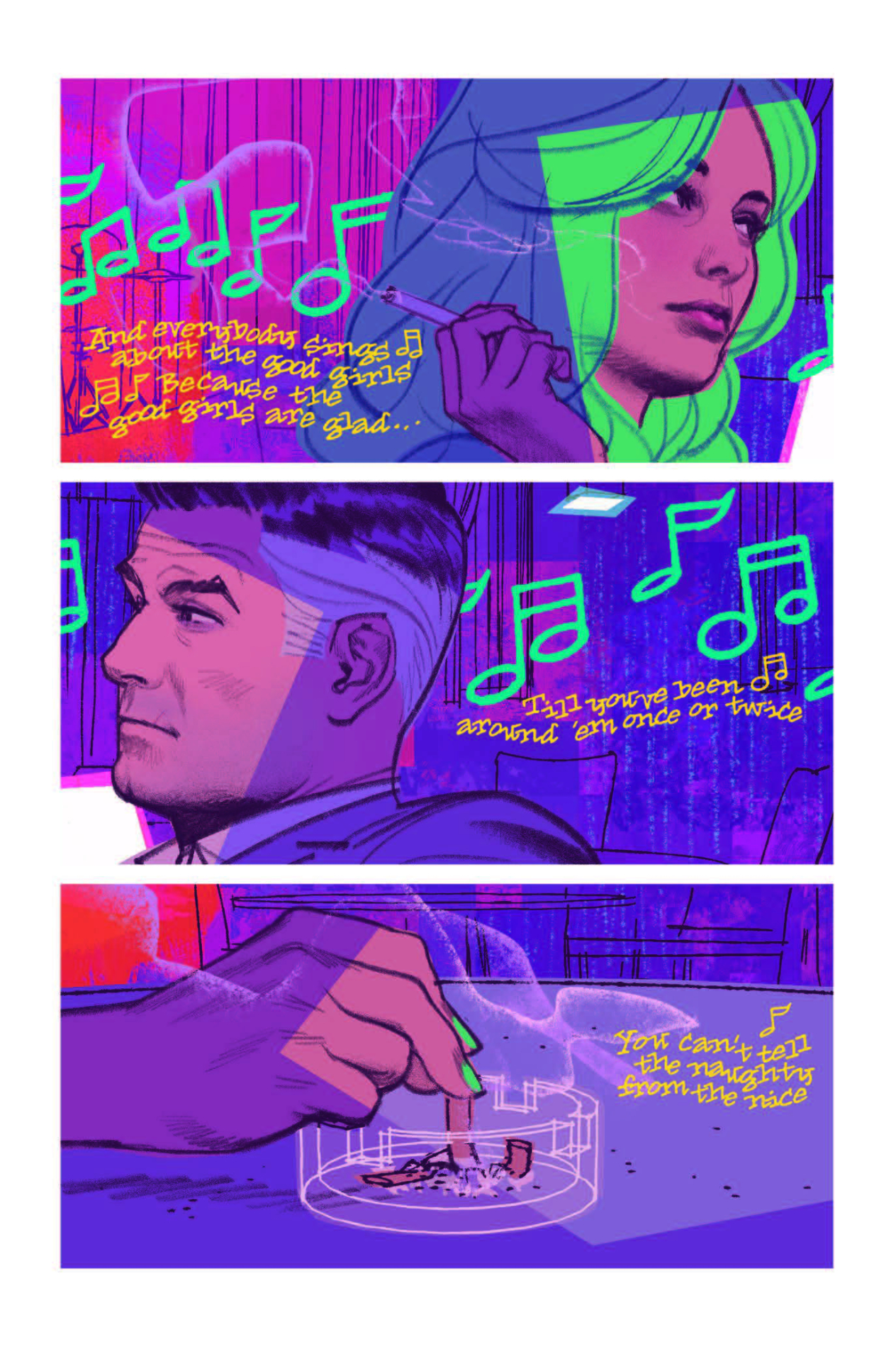
Nrama: Understood. Okay, so not only is Chance investigating the best friend of his current lover but he's got this much bigger problem now because he has killed a member of the JLI. First of all, does Chance see this as a crime? Because the argument could be made he was doing it in self-defense, right?
King: I think. I mean, I didn't make it entirely self-defense in that issue. I purposely did not make it like, someone's going to die if Chance doesn't act. But Guy Gardner is doing something super evil. He has gone off the wire. He's putting a drill to Ice's head. And at this point, Chance is in love with her. He just doesn't tolerate what Guy does and lets his anger get control of him, and kills him. So it's not exactly self-defense, but it's not exactly unjustified.
Also, Chance is not a superhero, as he says a thousand times. He's not Booster Gold. He's not like Superman in any way. He's a guy who dies for money. He's a private investigator. His morality is not our morality. I don't think for one second he regrets killing Guy Gardner. He thinks Guy Gardner was an asshole who deserved it. But also he doesn't want to be caught. He doesn't want to spend the last days of his life in jail, because he's got six days left to live. I think he wants to spend those six days with Ice. But in terms of the death, I don't think he cares.
But, as I said, you know, twists are coming. There's a twist at the end of seven, which leads us sort of right back to that exact dilemma.

Nrama: Right. Is Chance worried about Ice going down for the crime?
King: Yeah, that's the problem for him. Chance starts this whole thing being like, 'I don't care about anyone. That's why I die for a living.' You know, he gets shot in the chest to save Lex Luthor, and later Luthor says, 'What if they shot you in the head? You would've just died.' That's at the beginning, and Chance doesn't care about anything, and nobody cares about him.
But him finding Ice, finding someone he actually cares about in a very existential sort of way right before he goes off the cliff and dies – that's the tale of this story. It's him learning to care. And we've seen his last words. His last words were, 'I love you.'
Nrama: Yeah, right. At the beginning, does he not care about things because of the experience he had with his father? His father took some money from mob goons and got killed, right in front of young Chance. Or at least it's implied that he got killed.
King: Yeah, it's his origin. It's very Batman/Daredevil, where his father is kind of like a boring accountant and steals some money from the mob, and the mob comes and kills him for it. But what makes it different, I guess, from both of those origin stories, is his father drops to his knees and begs not to die. He says, 'Please don't kill me, please don't kill me,' and then gets shot anyway. To Chance, that moment of his father being reduced to being afraid of death, I think was his big motivation. He says, 'I'm never going to be afraid, like my father is. I'm never going to beg for death not to come back.' So he spends his life dying. As he tells Ice and Fire in this issue, he wins by dying.

Nrama: Fantastic. So many great one-liners throughout this book.
King: It's a good one-liner book. And that works because of Greg … because his expressions are so subtle to be exactly tailored to what you wrote. Like, I can't change it that much. It has to be exactly what it is now.
Nrama: Oh my God, yeah. His facial work is incredible.
King: Yeah, he does everything. Colors, inks, stencils, and the faces. Occasionally the letters. I just want people to see this book. I want them to see how gorgeous and sexy it is. It's one of those books that, when I first got the art for Book 7, I was just like I can't wait to get this in people's hands. It feels like I'm sitting on a treasure and I can't share it. I can't wait for people to see how beautiful this issue is. None of what we talked about is important to this book. What is most important to Book 7 is that it is the sexiest comic book in eighty years of comics.
Nrama: Yes, it really, really is.
King: That's the takeaway.
Nrama: I'm definitely going to try to work, 'the sexiest comic book in eighty years of comics' into this title somehow.
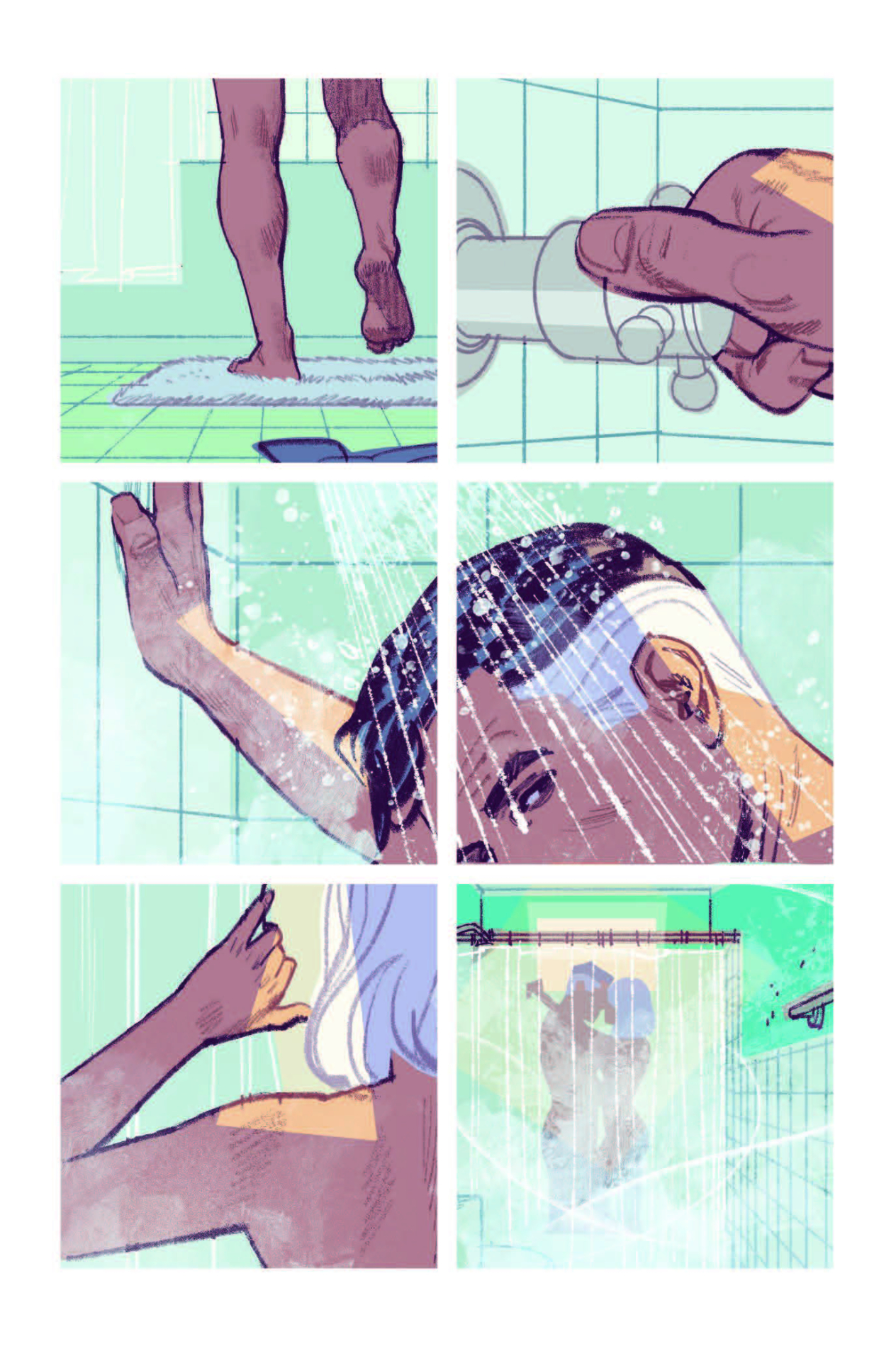
King: Do it, because it is. Take that Matt Baker!*
[*Author's note: Matt Baker was an American comic artist who drew, among many other things, one of the first examples of the graphic novel: It Rhymes With Lust. His work is, indeed, very sexy.]
Tales of the Human Target Book #1 goes on sale August 23. The Human Target Book 7 goes on sale September 27.

Grant DeArmitt is a NYC-based writer and editor who regularly contributes bylines to Newsarama. Grant is a horror aficionado, writing about the genre for Nightmare on Film Street, and has written features, reviews, and interviews for the likes of PanelxPanel and Monkeys Fighting Robots. Grant says he probably isn't a werewolf… but you can never be too careful.


